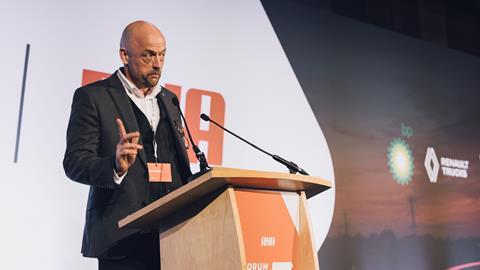Reports of hauliers succumbing to cost pressures amid hugely challenging conditions are sadly becoming regular reading.
It’s fair to say that new year industry optimism is in short supply after a turbulent 2023 where more than 450 hauliers went bust – twice the number of the previous year.
Youngs Transportation and Logistics and North West Cargo can be added to a growing list of well-known haulage firms entering administration alongside Knights of Old Group, Lloyd Milton, Lloyd Fraser, WH Barley, Magnus Group and Tuffnells.
Current economic realities are troubling all sectors as the cost-of-living crisis continues to hit consumers’ pockets. This of course affects our sector directly and indirectly, and operators are having to dig deep to survive.
We must be realistic about the economic bigger picture which to some degree is even out of governmental control. But we have to target the areas where we can make an impact – and collaboration is key.
We must to do everything we can to influence ministers, officials and policymakers across the country – local and national.
This is about representing the views and realities of our members who are seeing freight volumes falling (10-15 percent last year) and costs rising (nearly 10 percent, excluding fuel).
It’s also about building consensuses across trade bodies where there are commonalities.
We’re fully focused on articulating the challenges firms are facing and building the strongest cases to go back to decision-makers with compelling, evidence-based, and economically literate arguments why we need to do things differently.
Take London for example. TfL is bringing in new criteria for HGVs of over 12 tonnes gross weight entering the capital from late October. Their ‘Progressive Safe System’ (PSS) builds on Direct Vision Standard (DVS) with new technology designed to improve road safety.
Operators tell us they’re concerned about the timescales officials have imposed on getting their fleets compliant amid doubts that there will be enough kit to go around and the technicians then available to fit it; it’s worth reminding ourselves that there’s a growing shortage of heavy vehicle technicians serving the industry – a point we’re separately making to government.
Haulage is heavily regulated and firms are used to keeping up to date with regulatory changes; it’s quite rightly a fundamental part of the job. But it doesn’t come without its challenges – affordability as well as practical.
We’re working closely with Logistics UK and Association of International Courier & Express Services on DVS and we’re currently canvassing operators.
Some of our early findings make predictably bleak reading. Many businesses are saying they are operating with increasingly tight profit margins with a worrying number saying they cannot absorb any more costs.
Many are also reporting that they don’t think they’ll be compliant in time for the 28 October launch of the PSS – with availability of the right kit being a key factor.
Road safety must always be everyone’s top priority, but we’re increasingly concerned that unrealistic timescales imposed by TfL may lead to some hauliers choosing not to go into London, with unintended consequences for the supply chain which costs other businesses money and opportunity. As TfL are aware, there are other measures they can implement such as educating other road users in safe behaviours around vehicles that can improve road safety within London.
We’re also spearheading a group of trade associations to work with police on improving how abnormal loads are managed. Several police forces have adopted their own interpretations of standing guidelines – some imposing unrealistic timescales and burdensome bureaucracy to apply for dispensations and operational support.
This is hitting firms hard in delayed and sometimes postponed movements of loads, which could lead customers losing confidence in the haulier. This also comes with wider economic impacts on delaying infrastructure projects for example – which is something we’re currently examining.
We’ve made progress with some forces easing unnecessary restrictions and senior officers with national remit agreeing to work with us on longer-term projects to improve consistency. We’re also pleased to see that seven police forces in east England are working together on simplifying processes to support firms moving abnormal loads
More generally we’re clear we must keep campaigning hard on easing cost pressures on our industry – and making it clear the wider economic benefits of doing so.
We spelled out in our recent Haulage Manifesto and to the Chancellor ahead of his Spring Statement that government must relieve the tax burden on our industry to support economic growth.
This includes a continued freeze on fuel duty, VED for HGVs, the HGV Levy and other business taxes such as corporation tax.
An emissions-linked fuel duty rebate would reduce costs for firms who are using cleaner fuels like HVO because they want to do the right thing and slash their carbon output.
Anyone who came to our recent Parliamentary Reception will have felt the palpable energy in the room from members, stakeholders, and politicians from across the House – all determined to keep engaging and collaborating on practical measures to support the industry.
We need to harness that spirit and continue building these consensuses that make the most compelling cases that road haulage is a key economic growth enabler. The simple message is: support the haulage sector and you support the wider economy.
Richard Smith, MD, RHA














